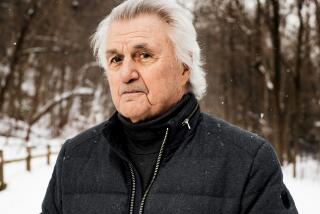Rags and Old Anthony : ANY OLD IRON <i> by Anthony Burgess (Random House: $19.95; 302 pp.) </i>
- Share via
Anthony Burgess is an iconoclast by temperament, and born into unemployment. What is an iconoclast to do in an icon-less era, but paint some?
Burgess’ active and by no means reticent intellect has weighed on some of his frailer novels. Even his little skiffs are loaded, openly or by way of contraband, with the author’s exemplars of the tragedy and irony of history, and the skittishness of art. It can make them yaw and sometimes go under.
It is good news that with “Any Old Iron” he has found a roomy and resplendent vessel--well, it does yaw sometimes--for his acerbic unquietness. He gets all his polymath’s baggage aboard: his scholarship, his fascination with history, his knowledge of music, his stubbornly eccentric characters, his gaiety and gloom and a rowdy crowd of Burgessian alter-egos.
“Any Old Iron,” to put it briefly, is the history of our century, told through the fortunes of seven highly individual members of a family that is Welsh and Russian in one generation and Welsh, Russian and Jewish in the next.
It contains, by way of prospectus: Joseph Conrad, the Titanic, World War I and World War II, the Spanish civil war, Stalin, Chaim Weizman, the establishment of Israel, a discursive band of Welsh nationalists, the pianist Artur Schnabel and King Arthur’s sword, Excalibur.
Sailing, limping, stomping or sneaking through all this is the Jones family of Gwent (formerly South Wales) and the Jewish brother and sister--he, a terrorist and philosopher; she, a tympanist--who attach themselves to it. It may give a notion of the energy involved that the philosopher/terrorist is the blandest of the lot, possibly because he is the narrator and has the burden of reflection.
This narrator, Harry Wolfson, begins with a scholarly discussion of whether a sword sneaked out of the Soviet Union years before by his brother-in-law, Reg Jones, could have been the Arthurian Excalibur. As Harry tells his story, the sword will reappear from time to time, both as historical symbol and as a comically prosaic bit of plot.
Harry then goes back to the rich and picaresque history of Reg’s father, David Jones, who ran away to sea after his own father caught him masturbating over an illustration of Belshazzar’s Feast in the family Bible.
On one of David’s first ships, the first mate is Joseph Conrad, who tells him forebodingly of the fragility of large passenger vessels. Sure enough, David finds himself working in the galley of the Titanic when it goes down. Surviving, he finds a cook’s job in a Russian restaurant in Brooklyn, where Ludmila, the owner’s beautiful daughter, chooses him for her husband.
They return to Wales, and David goes off to war, where he is repeatedly wounded and at one point, given up for dead. Ludmila, always decisive, goes to St. Petersburg in time to be injured in the first rioting of the of the Russian revolution. She returns home upon hearing that David has survived. They convalesce together, move to Manchester, and start a flourishing restaurant frequented by politicians and artists.
One of these is the pianist Schnabel. Burgess brings him on only long enough to pay a hackneyed compliment to Ludmila. He trots other renowned figures on and off in the same way. It is one of his signals that the Joneses are living in history.
Such a device can be deadly; yet Burgess’ playfulness is so compelling that it works very well indeed. The author is having fun with us; and so are we; but it is armed fun. It is hard to convey the special success of this alternation of humor and seriousness, of droll individual stories with the deadly movements of nations. “Any Old Iron” is both merry and grave.
The story of David and Ludmila, told dryly and with a touch of Welsh musicality, is only a prologue to the stories of their children, Beatrix, Reg and Dan; of Zipporah, the tympanist, who marries Reg; and of Harry, who loves Beatrix, mostly in vain.
Each is sharply, outrageously individual, yet each has a link to history. Beatrix, a cool lover of many men, becomes a Soviet specialist and works in the Foreign Office. Harry will leave Manchester for Israel and teach bombs and assassinations to the country’s “black” services, before returning and switching to philosophy.
Dan, slightly backward, is enamored of fish. He becomes a fishmonger after a rough time in World War II. Dan has a kind of second sight; it is he, who by chance and premonition, traces the passage of the Excalibur relic from the Benedictine abbey at Monte Cassino to Germany to the Soviet Union.
The central figure is Reg. Burgess has made him funny and human; he has also made him the Don Quixote of his time. He goes to Spain to fight for the Republic--or more precisely, being a small-nation Welshman, for Catalonia--and is imprisoned and beaten so savagely by Soviet agents that he loses his sense of smell.
Stationed in Gibraltar in World War II, he slips across to neutral Spain and, following Churchill’s policy of total war, knifes a German in a bar. This produces a major military-diplomatic embarrassment, which Burgess handles wonderfully well. “I mean you don’t conduct war in that manner,” Reg’s superior splutters. “The enemy’s faceless and impersonal, if you see what I mean.”
Reg is flown out under detention; he is to be sent to the bloodiest fighting in Normandy in hopes that he will get himself killed. Beatrix intervenes; he goes, instead, as an interpreter--all the Jones children speak Russian as well as Welsh--to an internment camp for Russians taken prisoner in Germany.
They will all be turned over to Soviet authorities, and most of them executed. Reg’s quixotic efforts to intervene land him briefly on a ship bound for Odessa and, for a while, in a British sanitarium.
For some years, he practices private life uneasily. In a final complex and far-fetched venture, he manages to steal the Excalibur sword from the Hermitage Museum in Leningrad.
The Excalibur exploit is protracted and plotty; so are a number of other episodes. The book, in fact, suffers from padding and more ambitiousness than it can always carry.
Nevertheless, it is one of the best that Burgess has written in recent years. Reg, in particular, is a shining and memorable figure. His obstinate simplicity and perpetual betrayal by the causes he believes in recall Guy Crouchback in Evelyn Waugh’s war trilogy.
Putting aside its wit, its fireworks and its ponderous exfoliation, “Any Old Iron” has the feeling of a memoir. Harry’s final commment about Reg, who retires grumpily to Israel where he will live quietly and be unhappy, has a radiant sadness to it. It sounds like an author’s farewell to a certain kind of arms.
“What he wanted, I think, was negative: not to have been reserved for the life of this century. Or he wanted, as we all do, reality transcending time. . . . The Roman ruins we stumbled through told us all about injustice that could never be avenged. The citrus fruits outlived them as they would outlive the law of Moses. It was a pity that Reg had lost his sense of smell.”
More to Read
Sign up for our Book Club newsletter
Get the latest news, events and more from the Los Angeles Times Book Club, and help us get L.A. reading and talking.
You may occasionally receive promotional content from the Los Angeles Times.









